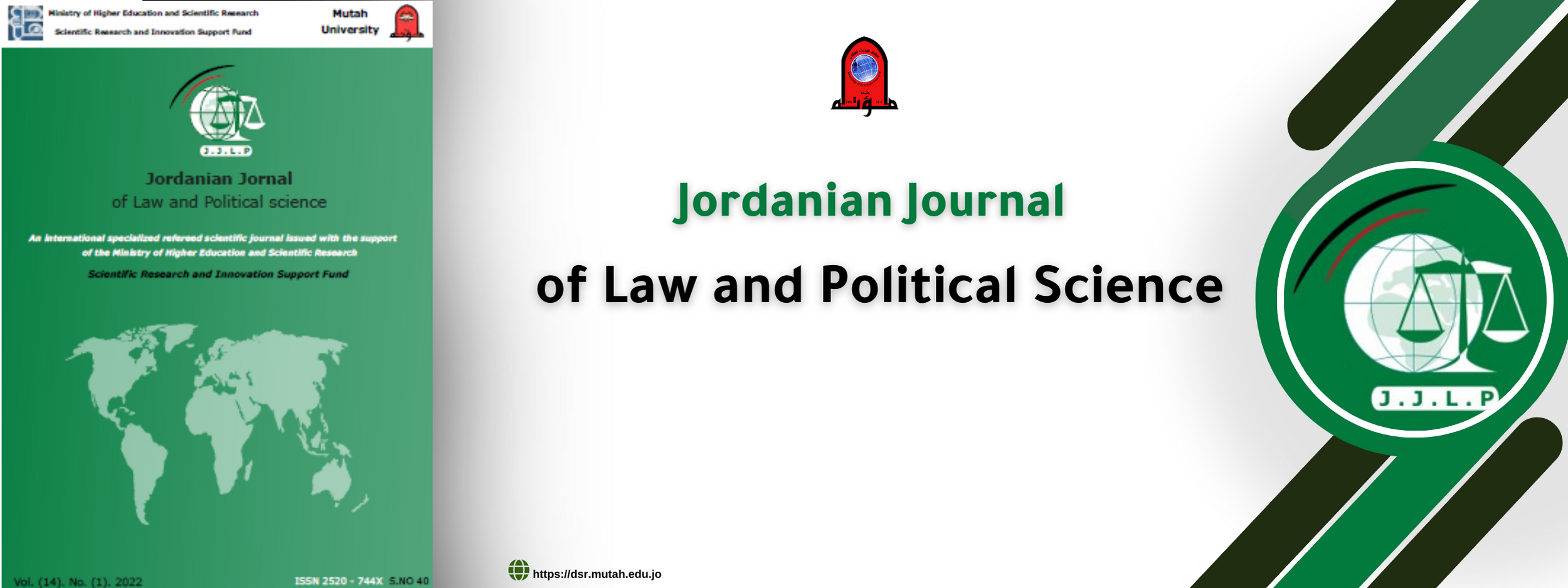The denial that eliminates the effect of the regular bonds in proving before the trial judge in accordance with the Jordanian law
DOI:
https://doi.org/10.35682/jjlps.v14i3.462Keywords:
Regular bonds, the denial that eliminates the effect of the regular bonds in proving, investing the validity of the handwriting, making malicious damage and showing intransigence while carrying out the proceduresAbstract
The present study aims to set an integrated regulation for the denial that eliminates the effect of the regular bonds in proving. The researcher adopts a descriptive analytical approach. He analyzes the Jordanian legal texts regulating this issue. He does that through shedding a light on some comparative laws, and referring to judicial diligence and jurisprudence.
This study is divided into two chapters. The first chapter sheds a light on the provisions regulating the denial that eliminates the effect of the regular bonds in proving. It identifies the methods of proving and the differences between them. Such differences are related to the stand of the person objecting to the bond. This person may be the debtor himself or the inheritors. The researcher identifies the aspects that the debtor denies. Such aspects involve: denial of the handwriting and signature. Such aspects involve denial of the content of the regular bond in case of acknowledging the validity of the handwriting and signature. That occurs when signing a blank paper. The researcher sheds a light on the procedures of making the denial. The legislator didn’t set a specific time nor procedures for making the denial. The denial of the bond is made after using the bond as a proof and before discussing the content of the bond or filing documents that contradict it. It is made in the first opportunity that the opponent gets before the trial court. The method of making denial is regulated through the procedures of filing the pleading the civil cases and the pleading filed as a response and the attachments with them. The response to the denial is governed by such procedures. The time of making the denial is governed by such procedures.
The second chapter sheds a light on the impact of denial that eliminates the effect of the regular bonds. It identifies the impact of such denial on the effect of the regular bond. This denial doesn’t eliminate such effect permanently. In fact, it eliminates such effect temporarily. The responsibility of proving the bond is assigned to the one submitting it. The latter person can claim for investigating the validity of the bond and assigning experts to assess it in accordance with the procedures set by the law. The result of the investigation is either acknowledgment of the validity of the denial of the bond, acknowledgment of the invalidity of the denial of the bond, acknowledgment of the lack of knowledge or realizing that the bond is submitted for making malicious damage.
The researcher reached several results. For instance, he found that the methods used for denying the bond differ based on the stand of the one making the denial. For instance, the debtor is asked to make the denial with full certainty. As for the inheritor, he’s asked to state his lack of knowledge without taking the oath. Contrary to the original rule, the legislator limited the power of the court in deciding to assess the regular bond by experts to prove its validity. He entitled the court to decide that under the request of the one submitting the bond.
The researcher suggested several recommendations. For instance, he recommend proving the lack of knowledge through requesting one (to take the oath). He recommends enacting legislations about the impact of discussing the goal of the bond on the right to claim denial or the lack of knowledge. He recommends adding legislations that allow the court to investigate the details and documents of the case. That shall enable the court to form its conviction about the validity of the handwriting or the signature before sending the bond to experts to investigate its validity. The researcher recommends enacting legislations that include provisions regulating the case of denial and claiming the lack of knowledge as a mean for making malicious damage and showing intransigence while carrying out the procedures







